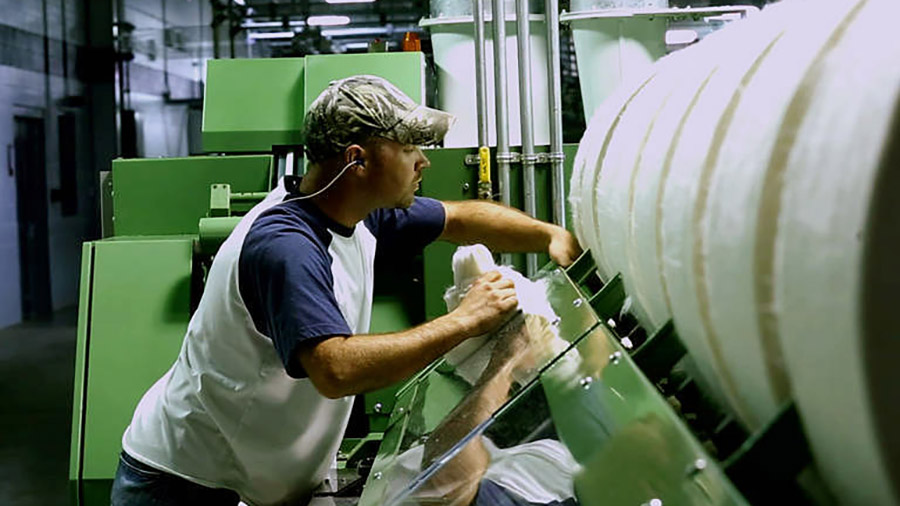The Department of Homeland Security (DHS) outlined an enhanced strategy to combat illicit trade and level the playing field for the American textile industry, which accounts for over 500,000 U.S. jobs and has been deemed critical to U.S.national security.
Two agencies under the DHS umbrella, U.S. Customs and Border Protection (CBP) and Homeland Security Investigations (HSI), said in a release on April 5 that they would further enhance their work together to protect the integrity of the U.S. markets, hold perpetrators accountable for customs violations and safeguard the American textile industry. Their plan will serve as a blueprint for future strengthened enforcement efforts through intensified targeting of small package shipments, joint trade special operations, increased customs audits and foreign verifications, and the expansion of the Uyghur Forced Labor Prevention Act (UFLPA) Entity List.
The new enforcement plan focuses on the following actions:
- Cracking down on small package shipments to prohibit illicit goods from U.S. markets by improving screening of packages claiming the Section 321 de minimis exemption for textile, UFLPA and other violations, including expanded targeting, laboratory and isotopic testing and focused enforcement operations.
- Conducting joint CBP-HSI trade special operations to ensure cargo compliance, including physical inspections, country-of-origin, isotopic, composition testing, and in-depth documentation reviews. CBP will issue civil penalties for violations of U.S. laws and coordinate with HSI to develop and conduct criminal investigations when warranted.
- Better assessing risk by expanding customs audits and increasing foreign verifications. DHS personnel will conduct comprehensive audits and textile production verification team visits to high-risk foreign facilities to ensure that textiles qualify under the U.S.-Mexico-Canada Agreement (USMCA) or the Central America-Dominican Republic Free Trade Agreement (CAFTA-DR). CBP reported it recently visited 31 facilities in Mexico—the first under USMCA—and 18 facilities in Honduras and is on track to double the number of total foreign verification visits compared to 2023.
- Building stakeholder awareness by engaging in an education campaign to ensure that importers and suppliers in the CAFTA-DR and USMCA region understand compliance requirements and are aware of CBP’s enforcement efforts.
- Leveraging U.S. and Central American industry partnerships to improve facilitation for legitimate trade.
- Expanding the UFLPA Entity List to identify malign suppliers for the trade community by reviewing additional entities in the high-priority textile sector for inclusion in the UFLPA Entity List.
“We are dedicated to ensuring a fair and level playing field for American businesses,” said DHS Secretary Alejandro N. Mayorkas. “The textile industry, like other industries, suffers when competitors use forced labor, violate customs laws, and engage in other illegal practices to undercut U.S. businesses and drive prices unfairly low. Through strengthened enforcement measures, enhanced inspection and testing, and increased information sharing, this Administration is protecting thousands of American workers and the U.S. textile industry.”
DHS said it has begun implementing this plan, building on ongoing efforts to ensure compliance. So far, DHS, under the current Administration, reported accomplishing the following:
- Launched 15 Trade Special Operations (TSOs) focusing on physical inspection of small shipments and cargo and post-release reviews to determine preferential treatment under free trade agreements eligibility.
- Examined textile imports, including 300 physical inspections, and reviewed documentation for additional shipments.
- Initiated trade audits on more than $10.5 billion in textile imports.
- Completed Textile Production Verification Team (TPVT) visits, as previously mentioned, to 44 factories and five raw material providers across Mexico and Honduras to ensure compliance of $800 million in textile imports claiming preferential duty treatment.
- Included ten entities from the textile sector in the UFLPA Entity List contributing to the stoppage of apparel, footwear and textile shipments.
In January, Secretary Mayorkas reportedly met with National Council of Textile Organizations (NCTO) members to discuss challenges in the textile industry. NCTO reportedly explained the significant harm that the textile industry is suffering at the hands of unscrupulous individuals and entities who create an unfair market by circumventing the operation of the nation’s free trade agreements, violating the UFLPA, and exploiting the de minimis shipment exception that established into law. Following the meeting, the Secretary directed the Department to provide him with a new comprehensive enforcement action plan to increase and expedite their work to combat illegal customs practices that harm the American textile industry.
“DHS is committed to expanding the UFLPA Entity List and sending a strong message to the importing community that the United States has zero tolerance for forced labor in our supply chains,” said Robert Silvers, Under Secretary for Policy and Chair of the Forced Labor Enforcement Task Force. “Enforcing our forced labor laws protects human rights and businesses and workers who play by the rules and should not be undercut by predatory and abusive labor practice.”
“We are pulling out all the stops to stay one step ahead of the bad actors that try to threaten this essential industry,” said Troy Miller, senior official performing the commissioner duties for CBP. “Trade cheats undercut American manufacturers as well as legitimate U.S. importers and trusted suppliers from our FTA partners who work hard to play by the rules. This plan ensures we are holding them accountable: violators will not qualify for preferential duty treatment under USMCA, CAFTA-DR, or other trade agreements and will be subject to payment of duties owed, penalties, seizures, and criminal investigations.”
DHS stated that textiles enforcement has been a longstanding priority trade issue. CBP and HSI will continually learn from enforcement results and consider additional actions as necessary.
In fiscal year 2023, CBP made 5,016 textile-related seizures with a domestic value exceeding $129 million, including smuggled apparel already tagged for retail sale and counterfeit clothing. The agency also protected and recovered $266.6 million on misclassified, undervalued, or unsubstantiated free trade agreement claims. CBP issued 1,859 penalties and liquidated damages against violators and detained and reviewed over 780 shipments related to forced labor with an estimated value of over $40 million, denying the entry of more than half of those shipments. Despite these efforts, the Department recognizes that more work is needed.
However, the statement did not garner all the accolades that DHS may have intended – because someone forgot to enroll the various trade associations in the conversations about these enforcement actions and more clearly understand what is at stake.
On April 5, the American Apparel & Footwear Association, the National Retail Federation, the Retail Industry Leaders Association, and the United States Fashion Industry Association authored a joint press release that addressed the announcement by the Department of Homeland Security regarding new enforcement actions to crack down on allegations of illicit textile trade.
“We appreciate the Department of Homeland Security’s announcement today outlining enhanced enforcement activities to prevent illicit trade in textiles,” the group wrote. “Our members support more than 55 million American jobs and invest considerable time and resources in their customs compliance programs. Many of our members are Tier 3 participants in the Customs-Trade Partnership Against Terrorism (C-TPAT). They are trusted traders and meet the high standards required to receive that designation by U.S. Customs and Border Protection and DHS. Our members are on the front lines for ensuring that they have safe and secure supply chains.
“While DHS launches this enforcement plan, we urge it to partner with our associations and our Associations’ members. A successful enforcement plan must include input from all stakeholders, clear communication with the trade, and coordinated activities with importers, especially if DHS finds illicit activity happening in the supply chain. The results of any illicit activities must be shared so that our members and other importers can act quickly to address the issue. As our members look to diversify their supply chains, especially back to the Western Hemisphere, we must make sure efforts are included to incentivize and not deter new investments.
“We look forward to working with DHS and the key agencies to ensure these enhanced enforcement activities are successful in stopping illicit shipments while facilitating compliant trade.”
Image courtesy Carolina Cotton Works















